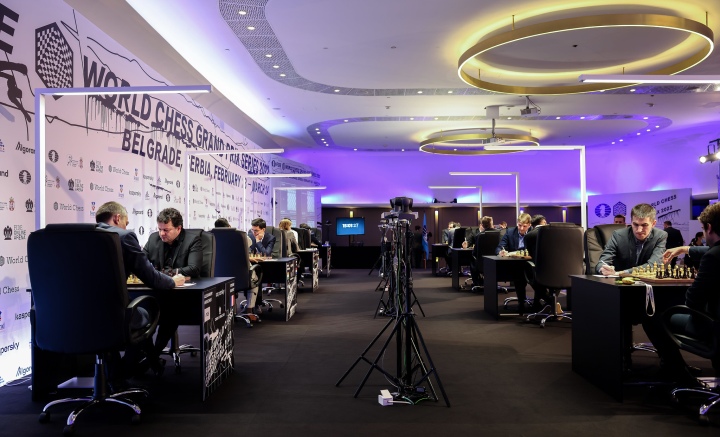Pool C is the only group where both games had a decisive outcome, while the rest ended in a draw
Richard Rapport stopped Vidit Gujrathi, and Vladimir Fedoseev delivered a blow to Alexei Shirov in Group C. All other games in the remaining three pools ended with a draw.
The first move in today’s round was made by two chess legends – Alisa Maric (the former contender for the title of women’s world champion) and Nigel Short (who played Garry Kasparov in 1993 for the world chess crown). They made the first move in the game between Vladimir Fedoseev and Alexei Shirov.

Pool A:
Dmitry Andreikin made a draw against Sam Shankland. In the Grunfeld, the opponents followed a well-worn theoretical line in which White sacrifices a pawn and gets compensation for it, but hardly anything more. The only concern for Black was to ensure that White did not coordinate his bishop and queen along the diagonal a1-h8. As soon as Andreikin restored the material balance, the position became even.
While Andreikin described it as “a boring game”, Sam Shankland said that “it was a little bit uncomfortable for Black”, but he didn’t see himself losing with enough time on the clock.

In the post-game analysis, the two players discussed whether the small advantages computers evaluate in a very close position have a realistic potential to be materialized. Both players agreed that this is hardly ever the case and suggested that players at a lower level should be much more careful when looking at such evaluations in “tight” positions.
“The computer is a useful tool to have, but if you’re not reasonably strong yourself and think for yourself, it’s entirely useless. You need to use your own brain, otherwise – you just become a monkey pressing buttons”, concluded Shankland.
In terms of their overall play so far, Shankland noted that he has “more points than he deserves”, referencing two mistakes in the openings of the previous games. Andreikin said that “the first two rounds were OK” for him but that in the third round – he was tired.
The game between Alexander Grischuk and Etienne Bacrot was the first to finish. The two made a quick draw in the Petrof. “This was a more solid game than we played in Berlin”, said Bacrot.

Grischuk opted for a very tricky line, but Bacrot knew the right moves. White was slightly better after the opening and even won a pawn. However, the position didn’t offer anything substantial, and the two moved to an endgame with opposite-coloured bishops with mutual weaknesses.
While Bacrot made three draws in three rounds, Grischuk only scored half a point. Asked how he feels about his performance so far, he said: “I made seven blunders so far… Better to make a draw than to lose”. When asked if he feels that he is getting into his “element”, Grischuk just said “no”.
Pool B:
Nikita Vitiugov and Amin M. Tabatabaei drew their game after 40 moves. The queens were quickly exchanged in the Carlsbad Variation of Queen’s Gambit, and the two sides moved to an endgame with a lot of positional manoeuvring. Black has a ruined pawn structure on the kingside in this line, but as tournament practice has demonstrated so far, it is really hard to exploit that. At some point, Nikita lost the thread and found himself in a slightly inferior position, but with no real weaknesses in his camp, he reached a draw by repetition with relative ease.
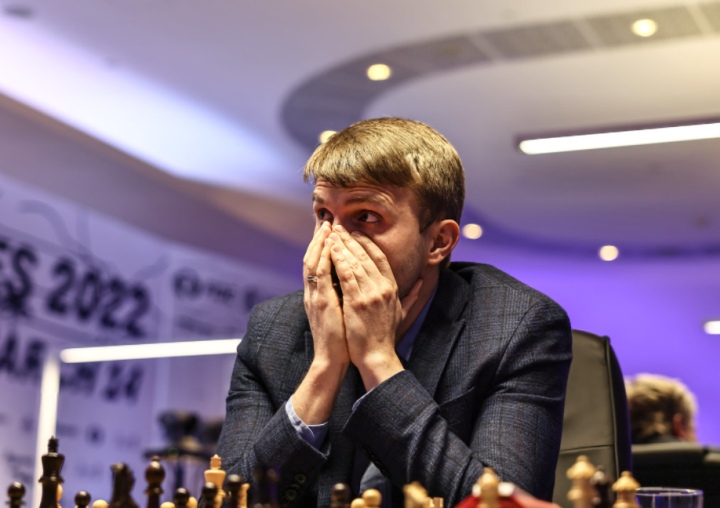
One of the more exciting games of the day was played by Pentala Harikrishna and Anish Giri, who had a perfect winning score until this round. Despite ending in a draw, the game was full of sharp turns.
In the Open Variation of Ruy Lopez, Harikrishna got a seemingly more promising position, threatening an attack on the Black king’s fortress. However, after White advanced his pawn from c3 to c4, Giri responded with a queen sacrifice:
Pentala Harikrishna – Anish Giri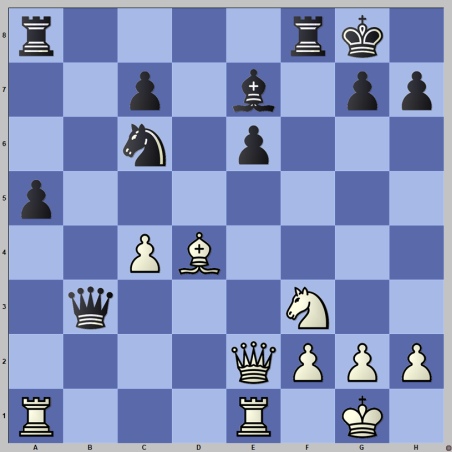
23…Qxf3, which was a straight way to force a draw.
Harikrishna said that he was surprised by the move. Black got a rook and a bishop for a queen, but, more importantly, he had the perpetual check along the f-file, which Anish executed.

Pool C:
In Pool C, both games ended with a decisive outcome.
Vladimir Fedoseev dominated Alexei Shirov in a rare line of the Slav. Before the game began, on first moves, Nigel Short suggested White should play the English opening, alluding to his country of origin. Fedoseev politely declined. Short later joked that if Fedoseev loses, it will be because he chose “the wrong opening”. However, that wasn’t the case as Fedoseev managed to create a very strong position against Shirov, surprising him in the opening.
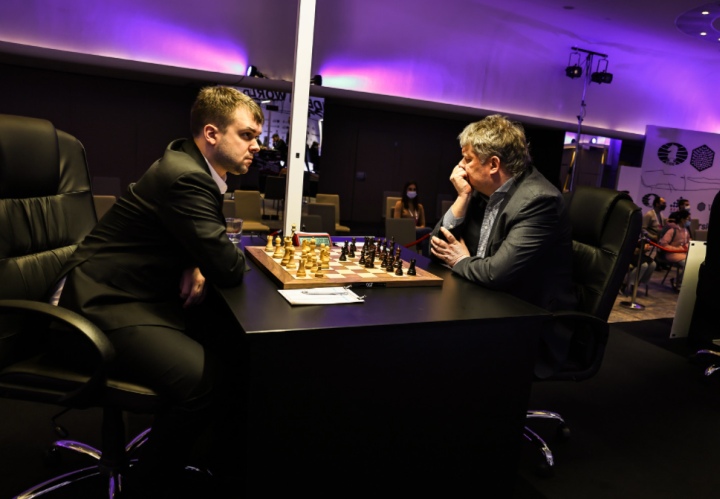
The opponent quickly found themselves in uncharted waters, and after Black’s 10…b5, White got a substantial edge making serious threats on the queenside and forcing Shirov to sacrifice an exchange. After grabbing an exchange, White opted to collect Black’s pawns on the queenside, allowing Shirov to move his king to safety and somewhat weaken the pressure. Feeling that in an ordinary course of events, Black will gradually go down, Shirov sacrificed a piece hoping to create some chances, but that only precipitated defeat. Following the move 23…Rb8 White was completely winning, even with his king uncastled and a passive rook on h1. On move 31 Shirov had to resign, facing an imminent checkmate.
Richard Rapport scored an important victory over Vidit Santosh Gujrathi (who had won his previous two games). In the Carlsbad pawn structure that emerged from Nimzo-Indian, Rapport smoothly carried out a typical plan of building a strong pawn centre with f2-f3 followed by e3-e4. This plan – introduced by Steinitz and developed by Botvinnik – worked very well for White this time.

With dominance in the center the Hungarian carefully regrouped his pieces for a decisive attack against which Gujrathi had no response. By move 28, it was all over for Black. Gujrathi almost made it to the time control but resigned on the move 40.
Pool D:
The last game of the round to finish was between Shakhriyar Mamedyarov and Alexandr Predke. In the Ragozin, Mamedyarov managed to come out of the opening with an extra pawn on the queenside at the cost of destroying his pawn structure. He then was mounting pressure on Black’s queenside but after 21.f4, White’s advantage disappeared.
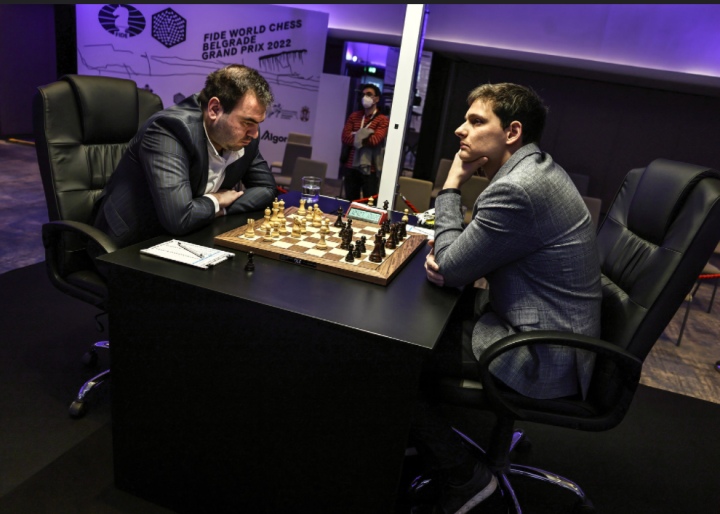
After massive exchanges on the left wing, White had an extra pawn on the a-file, but it was even, as Black had good coordination of his pieces and could quickly grind to a halt any attempts by White to advance. The opponents shook hands in a drawn rook endgame.
In another Grunfeld game of the round, Yu Yangyi drew with Maxime Vachier-Lagrave. The Chinese player was surprised by Black’s 16…a6 and spent quite some time pondering. He decided to trade pieces on c6, but it allowed Black to equalize. Following the exchanges in the centre, the two proceeded to a drawish endgame and split a point soon afterwards.

All the games in this group in all three rounds were drawn.
Round 4
The FIDE Grand Prix continues on Friday, 4th March, with the fourth round starting at 3 PM local (CET) time.
The pairings for the third round are as follows:
Pool A:
Dmitry Andreikin (2724) vs Alexander Grischuk (2758)
Sam Shankland (2704) vs Etienne Bacrot (2635)
Pool B:
Nikita Vitiugov (2726) vs Pentala Harikrishna (2716)
Amin M. Tabatabaei (2623) vs Anish Giri (2771)
Pool C:
Vladimir Fedoseev (2704) vs Richard Rapport (2762)
Alexei Shirov (2691) vs Vidit Santosh Gujrathi (2723)
Pool D:
Shakhriyar Mamedyarov (2776) vs Yu Yangyi (2713)
Alexandr Predke (2682) vs Maxime Vachier-Lagrave (2761)
The FIDE Grand Prix Series is brought to you by World Chess.
Leading partners supporting the FIDE Grand Prix Series 2022 include:
Kaspersky as the Official Cybersecurity Partner;
Algorand as the Official Blockchain Partner;
Prytek as the Technology Transfer Partner;
FIDE Online Arena as the official Partner.
Text: Milan Dinic
Photo: Mark Livshitz
Official Photo FIDE Grand Prix Belgrade Press kit
About World Chess:
World Chess is a London-based chess gaming and entertainment group and FIDE’s official broadcaster and commercial partner. World Chess organized the FIDE Championship Matches in Russia, the USA, and the UK, and revolutionized the sport by signing the biggest media partnerships in history. World Chess develops Armageddon, the chess league for prime-time television. World Chess also runs FIDE Online Arena, the exclusive official chess gaming platform. More at worldchess.com.
About FIDE:
The International Chess Federation (FIDE) is the governing body of the sport of chess, and it regulates all international chess competitions. Constituted as a non-governmental institution, it was recognized by the International Olympic Committee as a Global Sporting Organization in 1999.
FIDE currently has its headquarters in Lausanne, but it was initially founded in 1924 in Paris under the motto “Gens una Sumus” (Latin for “We are one Family”). It was one of the very first International Sports Federations, alongside the governing bodies of the sports of Football, Cricket, Swimming, and Auto Racing. It is now one of the largest, encompassing 195 countries as affiliate members, in the form of National Chess Federations. Chess is nowadays a truly global sport, with dozens of millions of players in all the continents, and more than 60 million games on average played every day.
More information: www.fide.com
About Kaspersky
Kaspersky is a global cybersecurity and digital privacy company founded in 1997. Kaspersky’s deep threat intelligence and security expertise is constantly transforming into innovative security solutions and services to protect businesses, critical infrastructure, governments and consumers around the globe. The company’s comprehensive security portfolio includes leading endpoint protection and a number of specialized security solutions and services to fight sophisticated and evolving digital threats. Over 400 million users are protected by Kaspersky technologies and we help 240,000 corporate clients protect what matters most to them. Learn more at www.kaspersky.com.
About Algorand
Algorand is building the technology to power the Future of Finance (FutureFi), the convergence of traditional and decentralized models into a unified system that is inclusive, frictionless, and secure. Founded by Turing Award-winning cryptographerSilvio Micali, Algorand developed a blockchain infrastructure that offers the interoperability and capacity to handle the volume of transactions needed for defi, financial institutions and governments to smoothly transition into FutureFi. The technology of choice for more than 700 global organizations, Algorand is enabling the simple creation of next generation financial products, protocols and exchange of value. For more information, visit www.algorand.com.
About Prytek
The Prytek Group combines technology companies and services companies to create a new asset class. We build legacy service businesses and combine them with deep tech technologies to increase margins. We buy out entire operations and create efficiency and scalability through our technologies. The group is divided into a Corporate Arm – which comprises of controlled companies and an Investment Arm – which acts as a VC and PE fund of the Group. The goal of the Corporate Arm is to generate consolidated cash with a legacy vision, while the Investment Arm is to develop products for our operations and generate profit via equity value growth and exit at a high valuation.
Prytek Building Technologies, Delivering Managed Services. Prytek: www.prytek.com
About FIDE Online Arena
FIDE Online Arena is the exclusive online chess gaming platform that awards online ratings recognized by FIDE. It hosts rated tournaments and games 24 hours per day. The platform runs an advanced fairplay engine. Play official games at chessarena.com.


